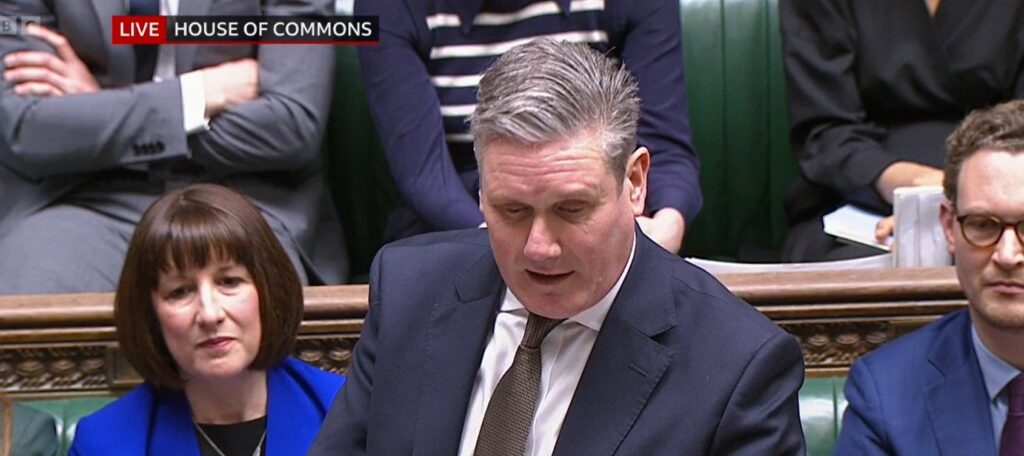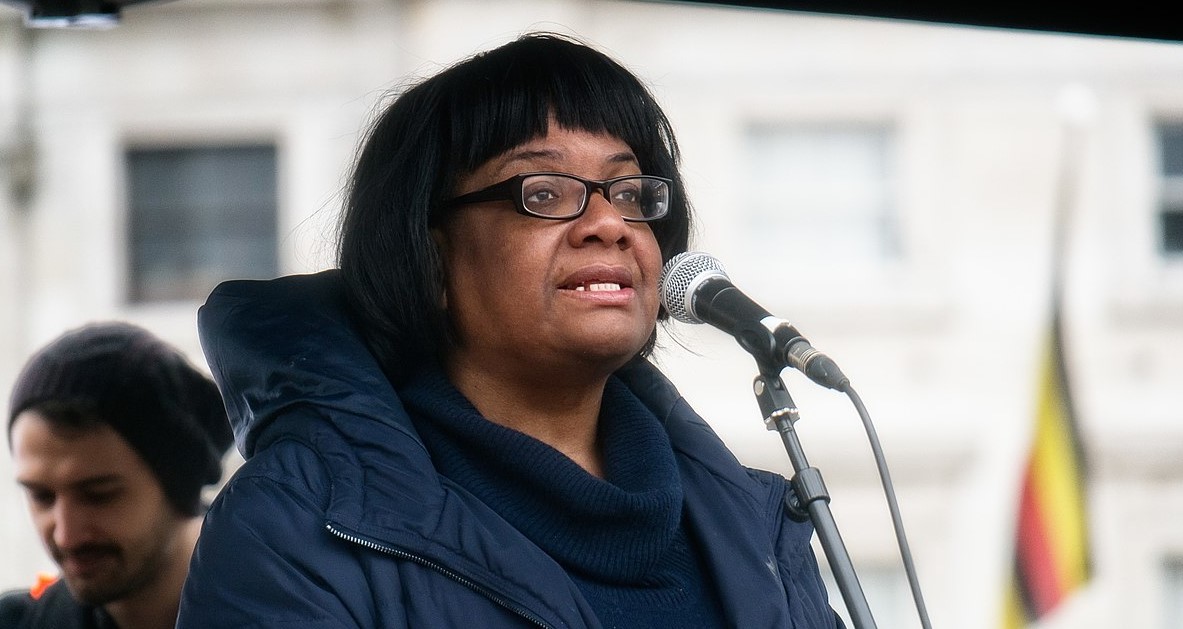By Bexley Left, SE London
Over the past week we’ve had to endure the unedifying spectacle of the Tory Party, which routinely stokes culture wars and racism as it pretends otherwise, reluctantly admit its biggest donor is guilty of the latter, while being attacked by another party that largely ignores or practices racism in its own ranks. It’s hard to know which of the two is more nauseating.
Last week Monday (March 11), The Guardian published an article detailing clearly racist and misogynistic remarks made by Frank Hester, who has donated at least £10m to the Conservative Party, about Labour MP Diane Abbott, with the wish that she be “shot”. Various Tory MPs and ministers were falling over themselves the next day to strenuously deny what was clear to most people: that the comments are unmistakably racist, misogynistic and vile.
It was only when Kemi Badenoch, a cabinet minister and black woman MP who is no saint on matters of race herself, tweeted later that day that the remarks are racist, that the Prime Minister, who had also declined to do so up that point, agreed with her, and other leading government ministers realised they couldn’t sensibly claim otherwise.
By Wednesday, Rishi Sunak was at the despatch box during Prime Minister’s Questions, acknowledging that Hester’s comments are racist while claiming he had apologised and essentially, we should all just move on. The Premier boasted about how much progress this country has made, as he is the first Asian and ethnic minority leader.
But as Abbott and others pointed out in the ensuing hours across the media, the Tory donor apologised for being rude and not for his racism or misogyny.
He categorically denied being a racist, in a phenomenon of the modern era that some have described as “racism without racists”. But even then, you have to accept something is racist in the first place.
And who was opposite Sunak at PMQs, appalled and horrified by the racism exposed by The Guardian, while demanding all donations should be returned to Hester? Sir Keir Starmer himself. The man who can only see and speak endlessly about one type of racism: antisemitism. On the question of anti-Black racism and Islamophobia within his own party, he is strangely quiet. But Starmer was quick to see anti-Black racism and misogyny in another party, and exploit these issues for political gain.
However, the Labour leader and his team haven’t had it all their own way.
As a result of the media light shone on Abbott and racism more widely, broadcasters like Channel 4 News have been looking inside the Labour Party itself and not just the travails of the Conservative Party.
Martin Forde KC was appointed by Starmer to look into allegations of racism, sexism, bullying and factionalism in his party following a leaked report. He documented anti-Black racism (some directed at Abbott), Islamophobia and a “hierarchy of racism” in the Party, among other flaws. Last week, Forde accused Labour of hypocrisy over the Tory donor affair as its own failings still remain. Diane Abbott also charged her party with double standards, and of using the race row to boost its funding while she remains suspended.
Starmer keeping Diane Abbot in the political wilderness
There surely couldn’t have been anything more sickening and hypocritical than Starmer, making his way to the backbenches after PMQs, to console Diane Abbott. And what on earth was Lindsay Hoyle, the Speaker of the House, playing at, by not calling the Hackney North and Stoke Newington MP to speak, even though she stood up 46 times in the hope of doing so in a debate about her? Was he under instruction again, as many suspect, like with the discussion some weeks ago about a ceasefire in Gaza?

Starmer has ensured Abbott has remained without the Whip for about a year following a letter she sent to The Observer about the degree to which Irish people, Jews and the Traveller community experience racism. She quickly apologised and retracted her statement. But what the Labour leader and his acolytes have clearly planned is to keep her suspended until the general election, and open up the way to impose a different candidate.
Like her longtime friend and ally, Jeremy Corbyn MP, she is seen as part of the supposedly antisemitic left who, in actuality, pose far too much of a threat to the vested interests of the economic and political establishment of this country, and cannot, under any circumstances, be allowed to get their hands on the reigns of power. That is a view shared by the right of the Labour Party, the Conservatives and the mainstream media.
So Starmer, in banishing them into the wilderness, and offering their heads to the ruling class as sacrificial lambs, was an act of self-immolation required to satisfy the establishment, and allow Labour the prospect of getting its hands on the levers of power.
However, the party now may have a bit of problem. Or maybe not. The widespread revulsion at Hester’s despicable remarks about Abbott has caused many to rally around her and highlight racism in our society. The demonstration outside Hackney Town Hall last Friday night in support of the MP, where she addressed the crowd, is testament to that.
She is a trailblazer who, in 1987, was the first black woman to be elected to parliament, and a consistent campaigner for and an inspiration to many in ethnic minority communities. Can Labour continue to deprive her of the Whip indefinitely? The early indications from Starmer and his leading lights are that the so-called independent investigation into Abbott’s letter must be allowed to take its course. But how long can it possibly take?
Make no mistake, there will be a calculation going on behind the scenes, as to whether this is damage that the party can afford, especially if the affair rumbles on towards a general election. Abbott appears to be hopeful Starmer will do the right thing. Many are not so sure. It is often the case that no action is taken against other Labour MPs and councillors who transgress through appalling statements or behaviour, or they are readmitted to the party following suspension, sometimes fairly quickly, after issuing apologies. This is primarily factionally driven but race is also a factor in how Labour treats some of its representatives.
Ideology, politics and race
A deeper question has to be asked about why Labour behaves as it does with regard to racism. The party’s right wing has no particular concern about racism and pays lip-service to the issue or cynically exploits it for political gain whenever expedient.
The crusade against antisemitism, especially within its own ranks, proves the point. Whether real or largely imagined, it was weaponised by the right to attack the left as being responsible for the racism seared into wider public consciousness. The right will talk at length about its drive to root it out of the party and elsewhere in society.
But Labour believes anti-Black racism and Islamophobia aren’t quite so popular with the middle-of-the-road voters it needs to win over in the next general election. So it stays largely silent on those manifestations of hatred and prejudice.
There’s a growing feeling among sections of the black and Asian community that Labour takes their vote for granted, and isn’t really serious about tackling these issues beyond cosmetic tinkering with a great deal of scepticism around its proposed plans for a Race Equality Act.
It has always been the case that the Labour Party takes this demographic for granted without doing enough to seriously tackle the structural disadvantages those communities face. The only exception to this was the Race Relations Acts, introduced by Labour governments in the 1960s and 1970s, set against a more chequered general history on race and immigration.
Labour as part of the government of an Imperial state
An article titled ‘Labour is an Obstacle to the Anti-Racist Movement’, written by the academic David Wearing and published in Novara Media in July 2020, is worth mentioning.
In many ways, the author doesn’t say anything that hadn’t been said before or since, but neatly encapsulates the party’s relationship with race. He explains: “Racism has persisted in Britain for so long, and to such a degree, because it is a problem of the mainstream, not the fringe. Since white supremacy is a structural issue, we need to understand the place of the Labour Party within that structure. Labour will be one of many obstacles facing the burgeoning anti-racist movement in the coming years ….”
Wearing notes there are three ways in which the party has been structurally enmeshed in British racism:
*Its formative history as a party of government in an imperial state.
*The socio-economic background of its leading figures and the dominant ideology within their milieu.
*The demands and incentives of electoral politics in a structurally racist society.
These three areas interact with and reinforce each other. The academic continues: “Racism in Britain is rooted in the history of its empire, a system of white supremacy imposed through violence. Labour took the helm of that system on a number of occasions, during the short-lived ministries of Ramsay MacDonald, and later under the leaderships of Clement Attlee and Harold Wilson. Brutal counterinsurgencies were waged from Malaya to Aden, as Labour governments exploited the resources of the Global South to lay the basis for Britain’s post-war social democracy.”
Wearing adds: “There are considerable career rewards to be gained from courting racist newspapers and swing voters, at the expense of a multi-ethnic working class concentrated in safe seats. An anti-racist Labour Party would attempt to meet the challenges of the landscape while sticking to some basic moral red lines, but naturally this is not what has happened in practice.”



